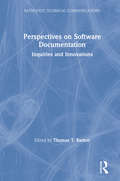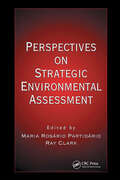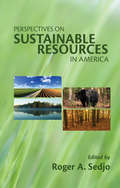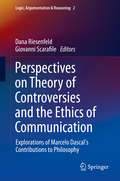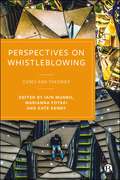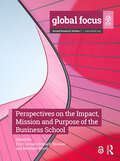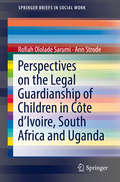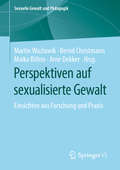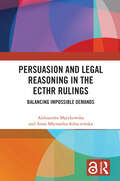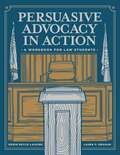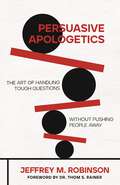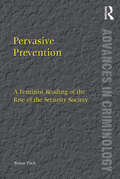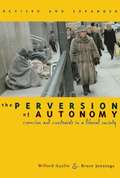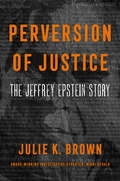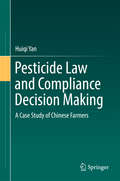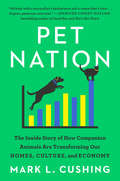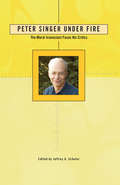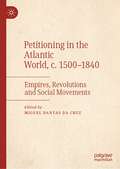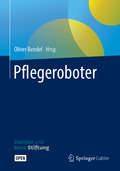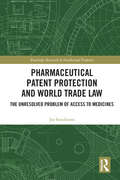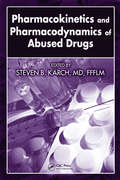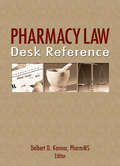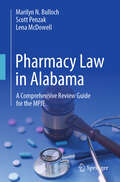- Table View
- List View
Perspectives on Software Documentation: Inquiries and Innovations (Baywood's Technical Communications)
by Thomas T BarkerThis book is designed to address the randomness of the literature on software documentation. As anyone interested in software documentation is aware, the field is highly synthetic; information about software documentation may be found in engineering, computer science training, technical communication, management, education and so on. "Perspectives on Software Documentation" contains a variety of perspectives, all tied together by the shared need to make software products more usable.
Perspectives on Strategic Environmental Assessment
by Ray Clark Maria Rosário PartidárioAn environmental assessment must be performed whenever a property transaction takes place. Those who donít may find themselves responsible for the past misdeeds of others. This book contains contributions by professionals from various locations who use Strategic Environmental Assessment (SEA) as a tool applied to water management issues. SEA helps make decisions that increase sustainability. Because of its procedural nature, it necessarily becomes tailor-made to different applications. Easily understood and geographic in scope, this book presents leading edge thinking and first hand knowledge on the applications of SEA in water management.Perspectives on Strategic Environmental Assessment is a comprehensive guidebook for performing environmental assessments all over the world. No other source provides you with as much information on the applications of SEA as a policy assessment and management tool. This book provides a blueprint for environmental assessments that safeguards you from the oversights of others.
Perspectives on Sustainable Resources in America
by Roger A. SedjoThe vast size of the United States and extensive variation of its climate, topography, and biota across different regions contribute to both the richness of the nation?s natural heritage and the complexities involved in managing its resources. A follow-up to RFF?s popular America?s Renewable Resources (1990), Perspectives on Sustainable Resources in America updates readers about the current challenges involved in managing America?s natural resources, especially in light of the increasing emphasis on sustainability and ecosystem approaches to management. Written to inform general audiences and students, as well as to engage the interest of experts, the book includes assessments by some of the nation?s most renowned scholars in natural resource economics and policy. An introductory chapter critically examines the concept of sustainability as it has been developed in recent years and asks how the concept might apply to individual resource systems. It considers the interrelatedness of ecosystem, economic, and social sustainability; the paradigms of resource sufficiency and functional integrity; and the contrast between weak and strong sustainability. The chapters that follow examine America?s experience with forests, water, agricultural soils, and wildlife. Highlighting the adaptability and resilience of resource systems, each chapter provides a description of the physical characteristics of the resource, a history of its use, a policy history, and a review of ongoing debates in management and policy. Perspectives on Sustainable Resources in America concludes with an innovative treatment of biodiversity as a natural resource. The chapter reviews the definitions of biodiversity, the ecological and economic meanings of biodiversity, and current efforts to preserve biodiversity, especially through regulatory approaches.
Perspectives on Theory of Controversies and the Ethics of Communication
by Dana Riesenfeld Giovanni ScarafileAssembling an unprecedented range of considered responses to the noted contributions to philosophy made by Marcelo Dascal, this collection comprises the work of his many friends, colleagues and former students. Beginning with a series of articles on Dascal's influential insights on philosophical controversy, this volume continues with explorations of Dascal's celebrated scholarship on Liebnitz, before moving on to papers dealing with his philosophy of language, including interpretations by Dresner and Herring on the phenomenon of emoticons. Taken as a whole, they provide a compelling commentary on Dascal's prolific and voluminous publications and include fresh perspectives on the theory of argumentation and the ethics of communication. The material collected here extends to political philosophy, such as Morris-Reich's paper exploring the ways in which German social scientists confront issues of antisemitism, the psychology of genius, and the origins of norms in society and culture. Much of the analysis is directly connected to, or influenced by, the philosophical themes, ideas and concepts developed throughout the years by Marcelo Dascal, while others have a looser connection to his work. All of them, however, attest to the remarkable and multifaceted philosophical persona of Marcelo Dascal, who is the guiding light of the rich conceptual dialogue running through this book.
Perspectives on Whistleblowing: Cases and Theories
by Iain Munro, Kate Kenny and Marianna FotakiSociety acknowledges whistleblowers as truth-tellers who bring urgent concerns to the public’s attention, but at the same time they are subjected to a host of retaliations including smear campaigns, unemployment, prison and exile. Investigating high profile case studies including Kiriakou, Snowden, Foxley and Assange, this book discusses recent transformations in whistleblowing practice. With first-person accounts by prominent whistleblowers, it explores the ethical and political dynamics of whistleblowing, use of new technologies in the practice and formal channels for whistleblower protections and legal reforms. Written by professionals and activists who support whistleblowers, this will be an invaluable resource for researchers working in the field as well as journalists, practitioners and legal professionals.
Perspectives on the Impact, Mission and Purpose of the Business School (EFMD Management Education)
by Howard Thomas Matthew Wood Eric CornuelWith contributions from some of the leading thinkers in business school education, this book explores the impact and purpose of the business school, and addresses some of the most important questions facing management education today. The diverse perspectives brought together by the EFMD in this volume examine a number of common questions, themes and challenges. These include: whether business schools should be viewed as schools of management, given the complexity of the business environment; what is the positive impact of business school research, and the balance of relevant, practical impact and academic rigour; the strategic evolution of business schools and how they may evolve in a more purposeful direction; and why business school leaders compete strongly but are reluctant to collaborate, and how collaboration may encourage greater positive societal impact. With insightful commentary and illustrative case studies, this book serves as a landmark publication on the value and impact of business schools. The book will be of particular interest to those working in business schools, higher education leaders, policy makers and business leaders seeking insight into the value, impact and future of business and management education.
Perspectives on the Legal Guardianship of Children in Côte d'Ivoire, South Africa, and Uganda (SpringerBriefs in Social Work)
by Rofiah Ololade Sarumi Ann StrodeThis brief reference surveys the national policy of three representative African countries on the legal guardianship of children who are without parents or families. Focusing on the widely varying legal systems of Côte d’Ivoire, South Africa, and Uganda, the authors highlight guardianship as emblematic of the continent’s shortcomings in child protection laws. The book’s key objective is bridging the communal aspects of traditional African society with the global standards set forth by the Convention on the Rights of the Child and other international entities. To this end, the three frameworks discussed here are compared and their strengths and limitations evaluated as applied to child protection standards in terms of core guardianship issues:Holders of parental authority and responsibilitiesAppointment of a legal guardianWho qualifies as a legal guardian?Responsibilities of a legal guardian in relation to the childTermination of guardianshipsThe primary audience for Perspectives on the Legal Guardianship of Children in Côte d'Ivoire, South Africa, and Uganda includes academics, researchers, and students in the fields of children’s rights, human rights, legal guardianship, and international law. It will also prove a useful reference for NGOs that focus on children’s rights, social workers and practitioners operating within the context of these three countries, professionals working within the African human rights system, and governmental law- and policymakers.
Perspektiven auf sexualisierte Gewalt: Einsichten aus Forschung und Praxis (Sexuelle Gewalt und Pädagogik #5)
by Martin Wazlawik Arne Dekker Bernd Christmann Maika BöhmIn diesem Buch wird eine Auswahl praxisrelevanter Forschungsergebnisse präsentiert und gleichermaßen erhalten hier pädagogische Einrichtungen die Möglichkeit, ihren Erfahrungsschatz einer größeren Fachöffentlichkeit zu präsentieren. Es wird deutlich, wie sehr eine eigenständige Wissenschaftslandschaft zur Thematik „Sexualisierte Gewalt in pädagogischen Kontexten und Institutionen“ in den vergangenen Jahren an Kontur gewonnen hat.
Persuasion and Legal Reasoning in the ECtHR Rulings: Balancing Impossible Demands
by Anna Młynarska-Sobaczewska Aleksandra MężykowskaThis book analyses the case law of the European Court of Human Rights (ECtHR) from the point of view of argumentative tools used by the Court to persuade the audience – States, applicants and public opinion – of the correctness of its rulings. The ECtHR judgments selected by the authors concern justification of some of the most difficult issues. These are matters related to human life, human dignity and the right to self-determination in matters concerning one's private life. The authors looked for paths and repetitive patterns of argumentation and divided them into three categories of argumentative tools: authority, deontological and teleological. The work tracks how ECtHR judges aim to find a consensual, universal, and at the same time pragmatic and axiologically neutral narrative, on the collisions of rights and interests in the areas under discussion. It analyses whether the voice of the ECtHR carries the overtones of an ethical statement and, if so, to which arguments it appeals. The book will be of interest to academics and researchers working in the areas of jurisprudence, human rights law, and law and language.
Persuasive Advocacy in Action: A Workbook for Law Students
by Laura Graham Robin Boyle-LaisurePersuasive Advocacy in Action: A Workbook for Law Students is designed with a singular focus: to help students hone their skills in persuasive legal writing and oral advocacy. As students navigate through its pages, they will encounter a rich tapestry of core principles, practical insights, and hands-on exercises tailored to elevate their prowess in crafting persuasive legal arguments, constructing well-reasoned briefs and other persuasive documents, and delivering compelling oral arguments. Through a blend of focused explanations and interactive exercises, this workbook empowers students to navigate the complexities of legal advocacy with confidence. The introduction summarizes the key differences between predictive and persuasive legal writing and gives students an overview of how the workbook is organized. Chapter 1 reviews the state and federal court systems. Chapter 2 discusses strategies for writing shorter persuasive documents. Chapters 3–8 cover the components of trial and appellate briefs. Chapter 9 walks students through the steps in the writing process, from pre-writing to proofreading the final document, and Chapter 10 covers the key aspects of effective oral argument. Each chapter includes exercises students can complete, either as part of their legal skills instruction or independently, to practice the skills covered in the chapter. The workbook also contains appendices with complete case files that can serve as the basis for persuasive writing assignments.
Persuasive Apologetics: The Art of Handling Tough Questions without Pushing People Away
by Jeffrey M. RobinsonWe cannot love others well without speaking the truthLoving our neighbors well includes engaging in robust conversations that destabilize false belief systems. In addressing the mind, will, and emotions of actual, complex people, Christian believers must develop various approaches to meet diverse personalities and multiple connection points. In Persuasive Apologetics, pastor and professor Jeffrey M. Robinson explores what's below the surface of intellectual-sounding objections to Christianity. He shows what it means to contend for the truth through real-life examples of communicating with those who hold differing beliefs. Robinson covers foundational and practical issues, such as • the importance of demeanor in being persuasive • various apologetic approaches • the influence of worldview presuppositions • using undercutting defeaters to expose faulty thinking • causes of nonbelief • the historical Jesus compared with figureheads of competing belief systems • the hope that Jesus offers Persuasive Apologetics will challenge serious seekers to peel back the layers of skeptical arguments and equip committed Christians looking to hone their apologetics skills.
Pervasive Prevention: A Feminist Reading of the Rise of the Security Society (New Advances in Crime and Social Harm)
by Tamar Pitch`The Prevention Society' is a definition that can otherwise be summarized as: the information society, the risk society, the surveillance society or the insecure society. This book shows the connections and differences between these explanations, whilst providing a gender reading of the ways in which social control manifests itself through precautionary measures. Today’s diffuse and pervasive prevention imperative symbolizes both a self-defining doctrine and the justification for a means of repression, segregation, and exclusion. From bodies to daily life and preventative war, Pervasive Prevention investigates the effects of this imperative for social control, its connection with neo-liberal hegemonic ideology, and the centrality in its dealings with women and the feminine.
Perversion of Autonomy: Coercion and Constraints in a Liberal Society, Second Edition
by Willard Gaylin Bruce JenningsIn this book, the authors discuss the needs and tension between individual autonomy and the needs of a well-functioning society.
Perversion of Justice: The Jeffrey Epstein Story
by Julie K. BrownThe New York Times Bestseller“A gripping journalistic procedural… Spotlight meets Erin Brockovich.” —Michelle Goldberg, The New York Times“Julie K. Brown's important book offers not just a definitive account of the Epstein case, but a compelling window into her own experiences as a dogged reporter at a regional newspaper, facing off against powerful interests set against her reporting.” —Ronan Farrow, Pulitzer Prize-winning author of Catch and KillDauntless journalist Julie K. Brown recounts her uncompromising and risky investigation of Jeffrey Epstein's underage sex trafficking operation, and the explosive reporting for the Miami Herald that finally brought him to justice while exposing the powerful people and broken system that protected him.For many years, billionaire Jeffrey Epstein's penchant for teenage girls was an open secret in the high society of Palm Beach, Florida and Upper East Side, Manhattan. Charged in 2008 with soliciting prostitution from minors, Epstein was treated with unheard of leniency, dictating the terms of his non-prosecution. The media virtually ignored the failures of the criminal justice system, and Epstein's friends and business partners brushed the allegations aside. But when in 2017 the U.S Attorney who approved Epstein's plea deal, Alexander Acosta, was chosen by President Trump as Labor Secretary, reporter Julie K. Brown was compelled to ask questions.Despite her editor's skepticism that she could add a new dimension to a known story, Brown determined that her goal would be to track down the victims themselves. Poring over thousands of redacted court documents, traveling across the country and chasing down information in difficulty and sometimes dangerous circumstances, Brown tracked down dozens of Epstein's victims, now young women struggling to reclaim their lives after the trauma and shame they had endured.Brown's resulting three-part series in the Miami Herald was one of the most explosive news stories of the decade, revealing how Epstein ran a global sex trafficking pyramid scheme with impunity for years, targeting vulnerable teens, often from fractured homes and then turning them into recruiters. The outrage led to Epstein's arrest, the disappearance and eventual arrest of his closest accomplice Ghislaine Maxwell, and the resignation of Acosta. The financier's mysterious suicide in a New York City jail cell prompted wild speculation about the secrets he took to the grave-and whether his death was intentional or the result of foul play.Tracking Epstein’s evolution from a college dropout to one of the most successful financiers in the country—whose associates included Donald Trump, Prince Andrew, and Bill Clinton—Perversion of Justice builds on Brown's original award-winning series, showing the power of truth, the value of local reportage and the tenacity of one woman in the face of the deep-seated corruption of powerful men.
Pesticide Law and Compliance Decision Making
by Huiqi YanThis book investigates pesticide compliance in China in order to provide a more comprehensive understanding of compliance and offers some feasible and adaptable suggestions for enhancing the effectiveness of this compliance. It discusses the weak implementation of Chinese laws and rules and emphasizes the necessity and importance of a compliance perspective in China that focuses on why laws are obeyed or broken. It examines how vegetable farmers' perceptions of amoral calculation affect their pesticide compliance behavior and analyzes how the legitimacy of law is related to compliance to better explain how all the variables interact to shape compliance. It discusses both qualitative and quantitative methods, and uses a large-N qualitative approach, which allows for systematic analysis and in-depth exploration. This book will help readers to understand compliance in developing China by adopting and developing compliance theories which are broadly developed in the West.
Pet Nation: The Love Affair That Changed America
by Mark CushingAn inside look at the forces behind how our pets become treasured members of the family.In the last 20 years pets have gone from the backyard to sleeping on our beds, then showing up in every corner of America. Pet Nation tells the story of this seismic shift and the economic, media, legal, political, and social dramas springing from this cultural transformation.Since 1998 the pet population in the U.S. has almost doubled -- about two-thirds of the country now owns a pet. No longer left to wander the neighborhood, dogs and cats eat special food, get individualized medical attention, and even fly in the cabin. As founder of the Animal Policy Group, Mark Cushing provides an inside look at the rise of Pet Nation, tracking the myriad ways pets are acquired (a "Canine Freedom Train" runs south to north), reporting on pet rights legislation (and the unseen problems that come with elevating their status), pet healthcare (revealing the truth and myths about large scale breeders), and discovering that despite what many organizations would have us believe, there is a shortage of dogs.Insightful, surprising, and full of great stories, Pet Nation opens our eyes to the big changes happening in front of us right now. It shows us not only what our love of animals says about pets, it shows us what it says about ourselves.
Peter Singer Under Fire
by Ph.D. Jeffrey A. SchalerOne of the leading ethical thinkers of the modern age, Peter Singer has repeatedly been embroiled in controversy. Protesters in Germany closed down his lectures, mistakenly thinking he was advocating Nazi views on eugenics. Conservative publisher Steve Forbes withdrew generous donations to Princeton after Singer was appointed professor of bioethics. His belief that infanticide is sometimes morally justified has appalled people from all walks of life. Peter Singer Under Fire gives a platform to his critics on many contentious issues. Leaders of the disability rights group Not Dead Yet attack Singer's views on disability and euthanasia. Economists criticize the effectiveness of his ideas for solving global poverty. Philosophers expose problems in Singer's theory of utilitarianism and ethicists refute his position on abortion. Singer's engaging "Intellectual Autobiography" explains how he came by his controversial views, while detailed replies to each critic reveal further surprising aspects of his unique outlook.
Peter Singer and Christian Ethics
by Charles C. CamosyInteraction between Peter Singer and Christian ethics, to the extent that it has happened at all, has been unproductive and often antagonistic. Singer sees himself as leading a 'Copernican Revolution' against a sanctity of life ethic, while many Christians associate his work with a 'culture of death. ' Charles Camosy shows that this polarized understanding of the two positions is a mistake. While their conclusions about abortion and euthanasia may differ, there is surprising overlap in Christian and Singerite arguments, and disagreements are interesting and fruitful. Furthermore, it turns out that Christians and Singerites can even make common cause, for instance in matters such as global poverty and the dignity of non-human animals. Peter Singer and Christian ethics are far closer than almost anyone has imagined, and this book is valuable to those who are interested in fresh thinking about the relationship between religious and secular ethics.
Petitioning in the Atlantic World, c. 1500–1840: Empires, Revolutions and Social Movements
by Miguel Dantas da CruzThis book deals with one of the most pervasive ways by which people have addressed authority throughout history: petitioning. The book explores traditional practices and institutions, as well as the transformation of petitions as vehicles of popular politics. The ability or the right to petition was also a crucial element for the development and operation of early modern empires, playing a major role on the negotiated patterns of the Atlantic World. This book shows how petitions were used in Europe, America and Africa, by the governors and the governed, by the rich and the poor, by the colonists and the colonised and by the liberal and the reactionary groups. Broken down into three thematic parts, encompassing both in chronological and geographical scope, the book deepens our understanding of petitioning and its relation with ideas of consent and subjecthood, nationality and citizenship, political participation and democracy. This book provides a rare comparative platform for the study of a subject that has been receiving growing interest.
Petty Justice
by Paul CravenUntil the late nineteenth-century, the most common form of local government in rural England and the British Empire was administration by amateur justices of the peace: the sessions system. Petty Justice uses an unusually well-documented example of the colonial sessions system in Loyalist New Brunswick to examine the role of justices of the peace and other front-line low law officials like customs officers and deputy land surveyors in colonial local government.Using the rich archival resources of Charlotte County, Paul Craven discusses issues such as the impact of commercial rivalries on local administration, the role of low law officials in resolving civil and criminal disputes and keeping the peace, their management of public works, social welfare, and liquor regulation, and the efforts of grand juries, high court judges, colonial governors, and elected governments to supervise them. A concluding chapter explains the demise of the sessions system in Charlotte County in the decade of Confederation.
Pflegeroboter
by Oliver BendelDieses Open-Access-Buch bündelt technische, wirtschaftliche, medizinische und ethische Reflexionen über Pflegeroboter. Pflegeroboter, im Moment noch mehrheitlich Prototypen, unterstützen oder ersetzen menschliche Pflegekräfte bzw. Betreuer. Sie bringen Kranken und Alten die benötigten Medikamente und Nahrungsmittel, helfen beim Hinlegen und Aufrichten oder alarmieren den Notdienst. Vorteile von Pflegerobotern sind durchgehende Verwendbarkeit und gleichbleibende Qualität der Dienstleistung. Nachteile sind Kostenintensität (bei möglicher Amortisation) und Komplexität der Anforderungen. Unter der wissenschaftlichen Leitung von Prof. Dr. Oliver Bendel trafen sich im September 2017 Vertreter verschiedener wissenschaftlicher Disziplinen im Rahmen eines Ladenburger Diskurses der Daimler und Benz Stiftung, um über den aktuellen und künftigen Einsatz von Pflegerobotern zu sprechen und Forschungspotenziale zu identifizieren. Die Autoren gehen in ihren Beiträgen auch Fragen aus Wirtschafts-, Medizin- und Informationsethik nach: Wer trägt die Verantwortung bei einer fehlerhaften Betreuung und Versorgung durch die Maschine? Inwieweit kann diese die persönliche und informationelle Autonomie des Patienten unterstützen oder gefährden? Ist der Roboter eine Entlastung oder ein Konkurrent für Pflegekräfte? Antworten müssen von Wissenschaft und Gesellschaft gefunden werden.
Pharmaceutical Patent Protection and World Trade Law: The Unresolved Problem of Access to Medicines (Routledge Research in Intellectual Property)
by Jae SundaramPatents, including pharmaceutical patents, enjoy extended protection for twenty years under the TRIPs Agreement. The Agreement has resulted in creating a two-tier system of the World Trade Organisation Member States, and its implementation has seen the price of pharmaceutical products skyrocket, putting essential medicines beyond the reach of the common man. The hardest hit populations come from the developing and least developed countries, which have either a weak healthcare system or no healthcare at all, where access to essential and affordable medicines is extremely difficult to achieve. Pharmaceutical Patent Protection and World Trade Law studies the problems faced by these countries in obtaining access to affordable medicines for their citizens in light of the TRIPS Agreement. It explores the opportunities that are still open for some developing countries to utilise the flexibilities available under the TRIPS Agreement in order to mitigate the damage caused by it. The book also examines the interrelationship between the world governing bodies, and the right to health contained in some of the developing country’s national constitutions.
Pharmacokinetics and Pharmacodynamics of Abused Drugs
by Steven B. KarchThis book is a concise and focused volume on the metabolism and measurable effects of drugs on the human body. Beginning with basic concepts and models, the book details the specifics of absorption, distribution, and elimination mechanisms and rates of commonly abused drugs. It analyzes the effects of drug use on human performance including response time, memory and cognition, and physiological changes. Packed with data and comparative studies, this handy volume considers the effects of marketed and prescription medications as well as illicit drugs. Containing 29 figures and tables and extensive references, this is a must-have resource for the influence of drug use and abuse on human physiology and performance.
Pharmacy Law Desk Reference
by Albert I Wertheimer Delbert KonnorYour primary source for information on the legal issues of pharmaceutical practice, care, and activityToday&’s pharmacist is faced with legal, ethical, and moral concerns in making the transition from traditional pharmacy practice to an expanded role in clinical pharmacy and patient drug management services. Pharmacy Law Desk Reference is a primer on the legal aspects of pharmaceutical practice, providing background on foundational legal concepts, and guidance on the Food, Drug, and Cosmetic Act (FDCA), the Controlled Substances Act (CSA), and the Federal Trade Commission. This unique book examines the major topics that impact pharmaceutical care, including professional liability insurance; the need for supportive personnel in pharmacy practice; patent law, trademarks, and copyrights; law and ethics; business law; HIPAA privacy in the pharmacy; electronic prescribing; and medication error reporting. Handy tables, figures, and exhibits make complex information easy to access and understand.The better pharmacists understand the regulatory and legislative framework that shapes their practice, the better they will be able to carry out their responsibilities to patients. Pharmacy Law Desk Reference offers a broad scope on established legal subjects, the current direction of the profession, and important contemporary topics that affect the clinical role of the practicing pharmacist. Each chapter is authored by a nationally recognized authority on one or more aspect of pharmacy law and many of the contributors are active in the American Society of Pharmacy Law. Topics addressed in Pharmacy Law Desk Reference include: telepharmacy collaborative drug therapy management trade secrets and trade secret protection anti-competitive practices the threat of civil and criminal liability the Health Insurance Portability and Accountability Act of 1996 (HIPAA) FDA inspections consumer protection laws credentialing pharmacy compounding accreditation employment contracts Medicaid and Medicare controlled substance registration and prescription orders forged prescription orders and many morePharmacy Law Desk Reference is a comprehensive resource on the professional, legal, and contemporary issues in pharmacy practice. It is a primary reference guidebook for pharmacy practitioners, leaders of state and national pharmacists associations, members of state boards of pharmacy, educators and students, and an essential addition to all pharmacy libraries.
Pharmacy Law in Alabama: A Comprehensive Review Guide for the MPJE
by Marilyn N. Bulloch Scott Penzak Lena McDowellIn most states, anyone wishing to obtain a license to practice pharmacy must take a state-specific test on pharmacy law called the Multistate Pharmacy Jurisprudence Examination (MPJE). This exam is a combination of Federal pharmacy law and state-specific laws. While some states have their laws, rules, and regulations in an easy to access area, there is no centralized area for all the content on the MPJE exam in Alabama. Furthermore, student pharmacists are typically only taught state-specific laws, rules, and regulations for the state in which their school resides. If a person graduates from a school in a different state, they must compile all the information for the MPJE themselves, which can be cumbersome and time consuming. This book seeks to bridge this gap by including all the information needed to prepare for the MPJE for the state of Alabama, authored by pharmacists who are actively practicing and teaching within the state.
